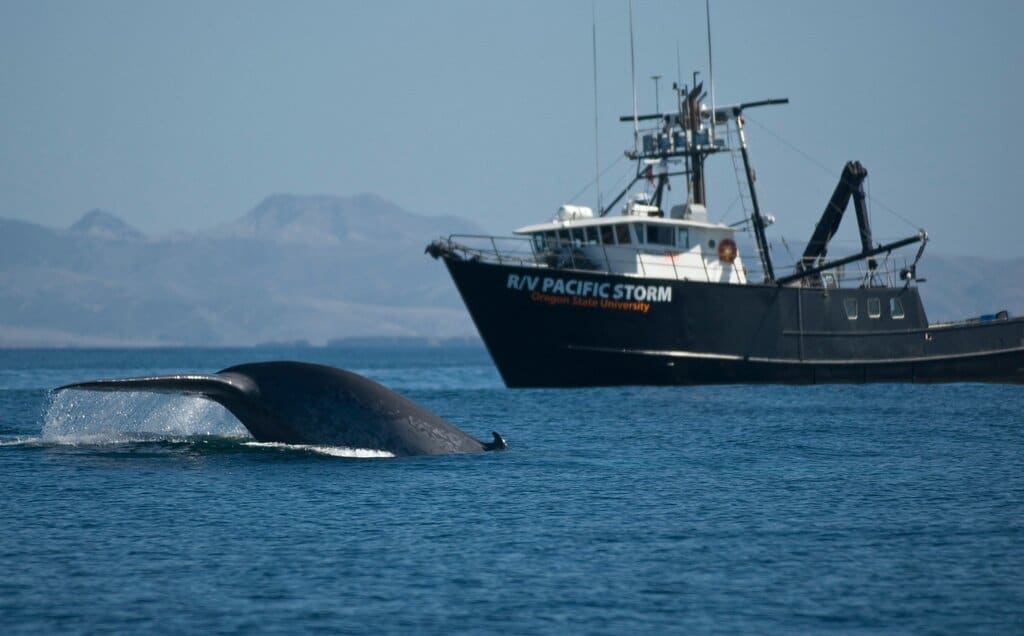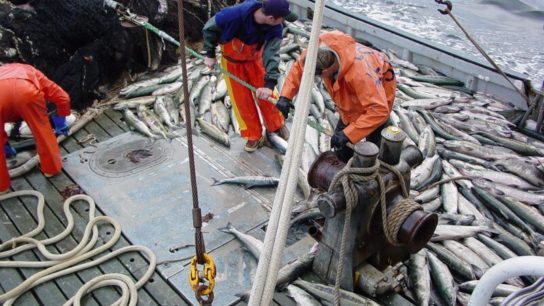Over the last few decades, noise pollution in the ocean has increased dramatically. As most marine species are highly dependent on sound for their survival, this type of pollution is extremely damaging to marine wildlife. Not only does it interfere with the key life functions of these animals but in some cases, it even causes death. As the impacts of noise pollution are being documented across all types of ecosystems, we must take action to improve the ocean soundscape and enable the recovery of marine life.
—
Many marine animals are highly dependent on underwater sound. Visibility is often low but sound is transmitted extremely well through water. As a result, it has evolved as an important sensory signal for marine wildlife, particularly for marine mammals such as whales, dolphins, and porpoises. They rely on sound to communicate, locate mates and prey, avoid predators, navigate, and even defend their territories.
However, over the past few decades, noise pollution in the marine environment has increased dramatically and is threatening the natural soundscape of the marine environment. Ships, seismic surveys, explosions, construction, and sonar devices have made the once peaceful environment into a loud, chaotic home which is extremely damaging for marine wildlife. This type of pollution is often overlooked in comparison to others but its impacts are now being documented across all types of marine ecosystems.
How Does Noise Pollution Affect Marine Mammals?
Underwater noise interferes with the key life functions of marine mammals. It can have a variety of negative effects such as temporary or permanent hearing loss, behavioural and physiological changes, masking – the ability to detect sound being overlapped or covered by another sound, injury, and even death.
1. Noise can harm marine mammals
Very loud sounds can truly harm marine mammals. If the animal is too close to the source of the sound, they panic and ascend too quickly to escape the noise. This has been known to cause decompression sickness, which can lead to tissue damage from gas bubble lesions. Loud man-made noises have also been linked to mass breaching events around the world.
But the loudest underwater noise comes from naval sonar devices. This works similarly to echolocation, a type of sound used by whales and dolphins, and can travel hundreds of miles underwater. The risk military sonar poses to cetaceans first received international attention when there were mass strandings of beaked whales. Since then, attention has been drawn to other mass strandings coincident with the use of sonar and the list of species involved has increased. The number of strandings that have been recorded are likely to be a small percentage of what’s really happening as severely injured animals rarely make it to shore.
Loud noises can also cause immediate damage such as hearing loss and when sound is one of the main tools marine mammals use for survival in the ocean, this can prove fatal.
You might also like: 10 Plastic Pollution in the Ocean Facts You Need to Know
2. Noise can alter the behaviour of marine mammals
A foreign sound can disrupt the natural behaviour of marine mammals. This is the most common impact of underwater noise and it can affect marine mammals in many different ways. They might move away from the noise, adjust their own activities to avoid the noisy times of day or even increase their anti-predatory behaviour.
Sonar has been recorded to alter the feeding behaviour of endangered blue whales. In an experiment conducted in Southern California, blue whales were tagged to see how they responded to active sonar. Even though the sound levels were much lower than those of military sonars, the blue whales still stopped feeding, increased their swimming speed and moved away from the sound source. This can have significant impacts on the whales’ individual fitness, foraging ecology, and population health.
3. Noise can interfere with communication
Noise pollution can interfere with the detection of acoustic signals in the marine environment. This means that the sound we are creating in the ocean is masking the sounds produced by marine wildlife. This can lead to changes in individual and social behaviour, altered metabolisms and hampered population recruitment which in turn can affect the health and service functions of marine ecosystems.
Noise pollution does not only decrease the communication range of marine mammals but it also causes them to change their vocal behaviour. For example, increased ship noise caused bottlenose dolphins to simplify their vocal calls. Higher dolphin whistle frequencies and a reduction in whistle complexity were recorded and it’s possible that this simplification may reduce the information content of their calls and therefore decrease effective communication. Marine mammals may also compensate for noise by making their signals longer, increasing the volume of their own calls, shifting their sound frequency or waiting to signal until the noise has gone. However, these changes can be costly.
What Can Be Done?
It is evident that noise pollution is having negative effects on many marine species. As they are already facing increasing pressures from climate change and overfishing, it is vital that we reduce our impacts where we can and as much as we can. To reduce anthropogenic noise in the marine environment, we need policies to reduce propeller noise from ships and people mitigating the sounds of sonar equipment, seismic air guns, pile driving and construction. We also need to develop quieter technologies; therein making it easier to reduce noise pollution.These actions can improve the ocean soundscape and potentially enable the recovery of some marine life.
Featured image by: Craig Hayslip (courtesy of OSU Marine Mammal Institute)
You might also like: What Is Light Pollution?

















